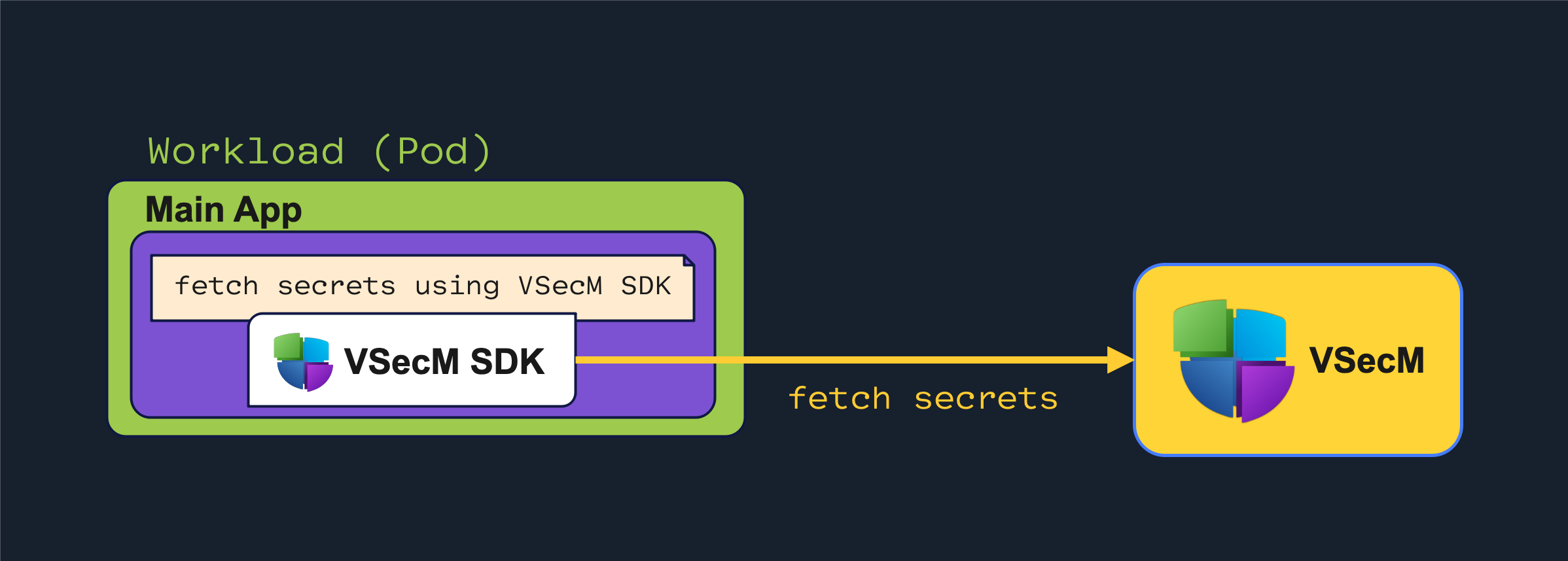The next
VSecM Contributor Sync
will be on...
Thursday, 2024-04-25
at 8:00am Pacific time.
Retrieve Secrets via SDK
Situation Analysis
If you are the creator of an app, and you have access to its source code, it would be beneficial to retrieve the secrets the app needs whenever it needs them through the VSecM SDK.
Fetching secrets using VSecM SDK will also enable you to…
- Rotate the app’s secrets without needing to restart or evict the app.
- Get meta-information about the secrets that are otherwise inaccessible.
High-Level Diagram
Open the image in a new tab to see the full-size version:

Implementation
We’ll define the ClusterSPIFFEID and “SPIRE Agent Socket” for our workload,
similar to the Mounting Secrets as Volumes use case.
Prepare Kubernetes Manifests
Here’s the ClusterSPIFFEID:
apiVersion: spire.spiffe.io/v1alpha1
kind: ClusterSPIFFEID
metadata:
name: example
spec:
spiffeIDTemplate: "spiffe://vsecm.com\
/workload/example\
/ns/{{ .PodMeta.Namespace }}\
/sa/{{ .PodSpec.ServiceAccountName }}\
/n/{{ .PodMeta.Name }}"
podSelector:
matchLabels:
app: example-app
workloadSelectorTemplates:
- "k8s:ns:example-apps"
- "k8s:sa:example-sa"
Here’s our deployment manifest:
apiVersion: apps/v1
kind: Deployment
metadata:
name: example
namespace: example-apps
labels:
app: example
spec:
replicas: 1
selector:
matchLabels:
app: example-app
template:
metadata:
labels:
app: example-app
spec:
serviceAccountName: example-sa
containers:
- name: example-container
image: example-app:0.1.0
volumeMounts:
- name: spire-agent-socket
mountPath: /spire-agent-socket
readOnly: true
env:
- name: VSECM_SIDECAR_SECRET_PATH
value: "/opt/app/credentials/secrets.json"
- name: SPIFFE_ENDPOINT_SOCKET
value: "unix:///spire-agent-socket/agent.sock"
volumes:
- name: spire-agent-socket
csi:
driver: "csi.spiffe.io"
readOnly: true
- name: credentials-volume
emptyDir:
medium: Memory
Application Code
Since we have access to source code, our application can directly fetch its secrets as follows:
package main
import (
"fmt"
"github.com/vmware-tanzu/secrets-manager/sdk/sentry" // <- SDK
"log"
"os"
"os/signal"
"syscall"
"time"
)
func main() {
d, err := sentry.Fetch()
if err != nil {
println("Failed to read the secrets file. Try again.")
println(err.Error())
return
}
if d.Data == "" {
println("no secret yet... Check again later.")
return
}
fmt.Printf(
"secret: updated: %s, created: %s, value: %s\n",
d.Updated, d.Created, d.Data,
)
}
Want an SDK in Your Favorite Language?
VMware Secrets Manager only has an official Go SDK at this time. If you have application code in another language, you can contribute to the following SDK initiatives:
Conclusion
Integrating VSecM Go SDK into application development workflows offers a robust and dynamic approach to handling secrets management. By leveraging the capabilities of VSecM SDK, developers can ensure that their applications have secure and efficient access to necessary secrets, facilitating smoother operations and bolstering security.
The ability to rotate secrets without impacting the application’s availability and access meta-information about the secrets are critical benefits that can significantly enhance the security posture of any application.
The VSecM SDK, while currently officially supporting only Go, highlights a significant moment of growth and opportunity within the developer community. This moment isn’t a limitation but a clarion call to action.
Such collaboration not only diversifies the toolkit available to developers but also strengthens the bonds within the community, fostering an environment where innovation thrives on the principles of security and efficiency.
By contributing to the development of the VSecM SDK in various programming languages, you are not merely coding; you are pioneering a movement towards a more secure, efficient, and community-driven approach in application development.